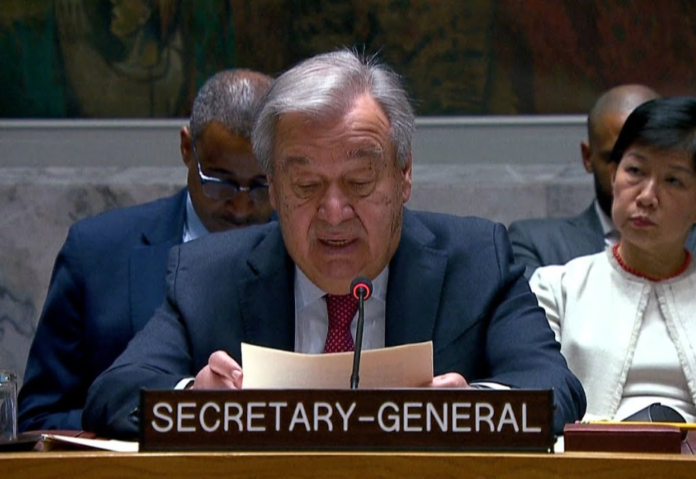According to UN Secretary-General Antonio Guterres, cyber operations made possible by artificial intelligence are increasing the threat; malware, wipers, and trojans are spreading; and the misuse of digital technology is becoming more complex and sneaky.
The head of the UN issued a warning on Thursday, stating that “the perils of weaponizing digital technologies are growing by the year” and that criminal, non-governmental, and government entities are increasingly engaging in destructive conduct in cyberspace. Meanwhile, cyber operations made possible by artificial intelligence are increasing the threat, according to Secretary-General Antonio Guterres, who also noted that “the misuse of digital technology is becoming more sophisticated and stealthy, and malware, wipers, and trojans are proliferating.”
The U.N. Security Council was also forewarned by him that “quantum computing could break down entire systems with its ability to breach encryption.” Positively, according to Guterres, digital advancements “are revolutionizing economies and societies,” bringing people together while also facilitating access to government institutions and services as well as news, information, and education. However, he added, the instantaneous connectivity that brings about great advantages is also making individuals, organizations, and governments susceptible.
According to Guterres, cybersecurity events have escalated to a “disturbingly common” level, involving everything from “relentless illicit activity” by criminal groups and so-called “cyber-mercenaries” to interruptions to health, banking, and telecommunications systems. The secretary-general also mentioned the growing use of cyberspace as a weapon in wars, as well as “a legion of hate merchants littering the information superhighway with fear and division.” “And the growing integration of digital tools with weapon systems, including autonomous systems, presents new vulnerabilities,” he stated. According to Guterres, exploits for software vulnerabilities are being offered online, along with the means to do so.
“Ransomware is one grievous example—a huge threat to public and private institutions and the critical infrastructure people depend on,” he stated. “According to some estimates, total ransomware payments reached $1.1 billion in 2023.” Beyond these expenses, however, according to the U.N. chief, such incursions have an impact on international peace, security, and stability. “Malicious activity that undermines public institutions, electoral processes, and online integrity erodes trust, fuels tensions, and even sows the seeds of violence and conflict,” he stated. In order to guarantee that regulations pertaining to cyberspace and AI are focused on encouraging the safe use of these technologies, Guterres has been advocating for international action.
He informed the UN council that the Summit of the Future, which he has invited the leaders of the 193 UN member states to attend during their yearly meeting at the General Assembly in late September, “represents a pivotal chance to support the maintenance of international peace and security in cyberspace.” He also applauded the General Assembly’s attempts to reach a consensus on a new cybercrime convention in the upcoming months, “which should deepen cooperation while protecting human rights online,” as well as its examination of “the applicability of international law to state activities in this domain.”
During its leadership of the Security Council this month, South Korea selected the theme of cybersecurity as its flagship event. Prior to the meeting, its Foreign Minister, Cho Tae-yul, presented a statement on behalf of sixty-three nations acknowledging the problem of cyberspace misuse and applauding the council’s attention to this subject for the first time. It claimed that in order for the most powerful organization in the UN to “remain agile and relevant in light of rapidly evolving technology”—particularly its impact on global peace and security—more council sessions and briefings are necessary. The United States’ commitment “to work with all responsible actors to safeguard the benefits of cyberspace, build digital solidarity, and leverage technology” to achieve UN requirements was emphasized by U.S. Ambassador Linda Thomas-Greenfield.
However, she claimed that an excessive number of governmental and non-governmental entities are abusing internet connectivity to threaten victims and pilfer funds and ideas from public and private institutions. According to Thomas-Greenfield, the council has to come together, tighten the rules for appropriate conduct, and hold nations accountable for breaking them.
Do Follow: CIO News LinkedIn Account | CIO News Facebook | CIO News Youtube | CIO News Twitter
About us:
CIO News is the premier platform dedicated to delivering the latest news, updates, and insights from the CIO industry. As a trusted source in the technology and IT sector, we provide a comprehensive resource for executives and professionals seeking to stay informed and ahead of the curve. With a focus on cutting-edge developments and trends, CIO News serves as your go-to destination for staying abreast of the rapidly evolving landscape of technology and IT. Founded in June 2020, CIO News has rapidly evolved with ambitious growth plans to expand globally, targeting markets in the Middle East & Africa, ASEAN, USA, and the UK.
CIO News is a proprietary of Mercadeo Multiventures Pvt Ltd.






